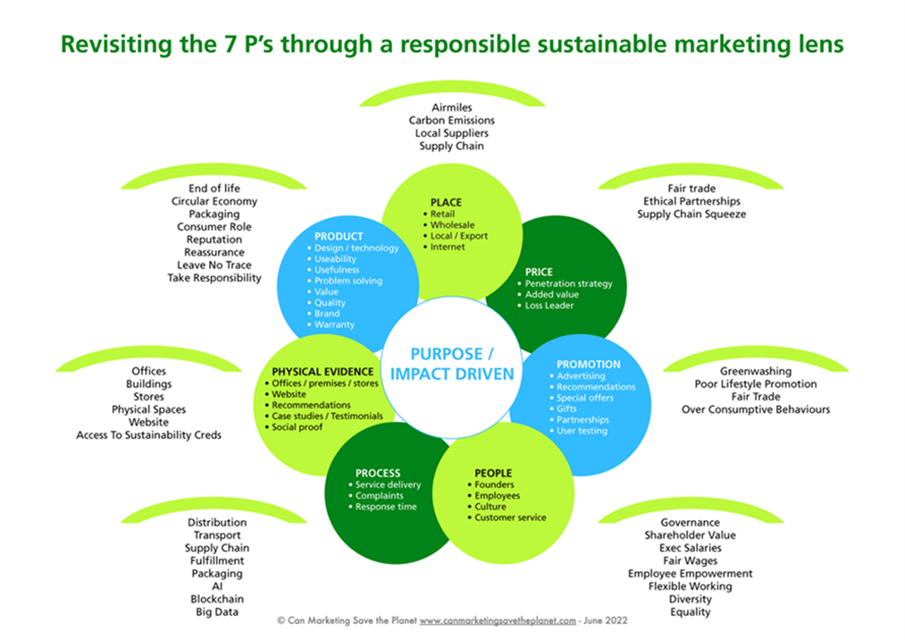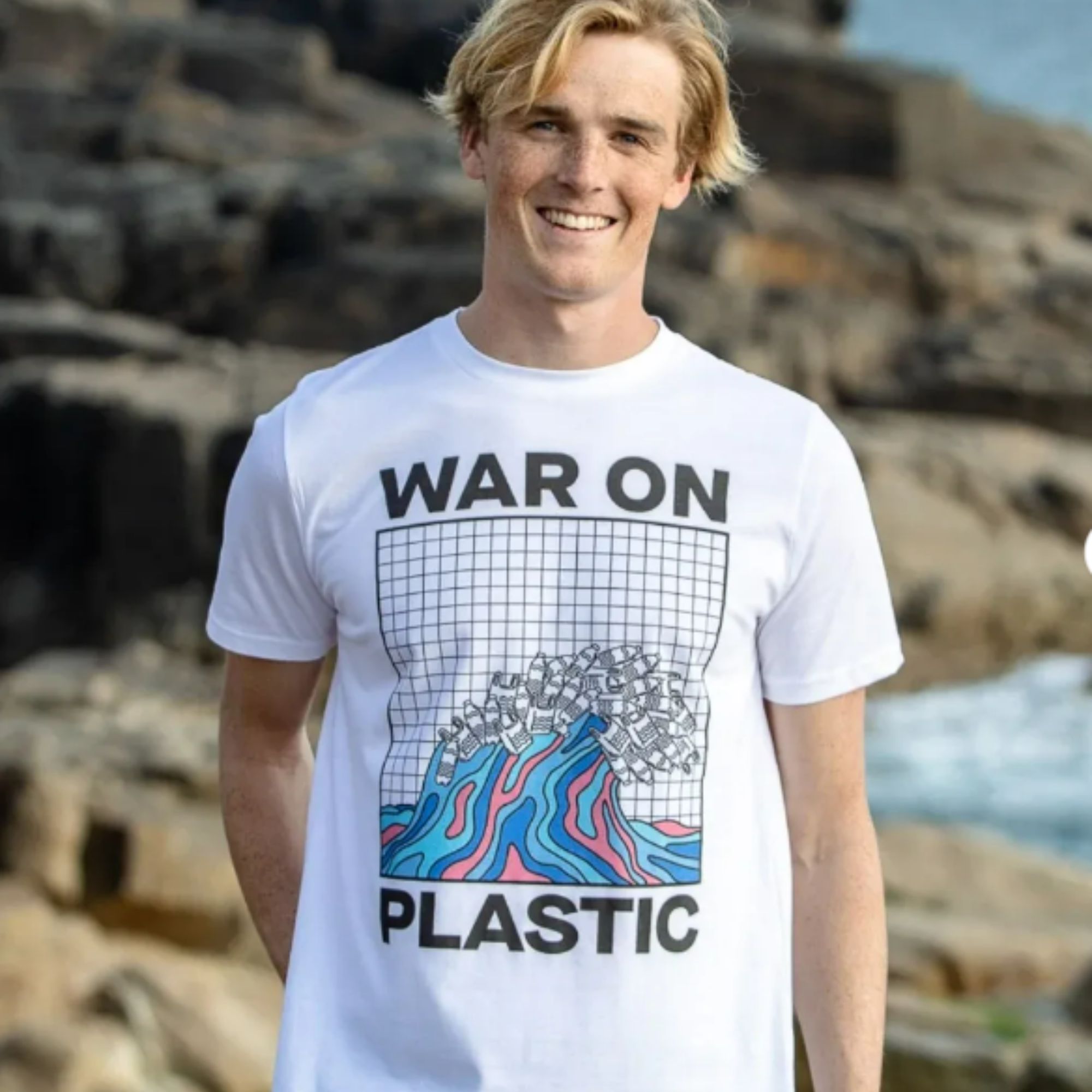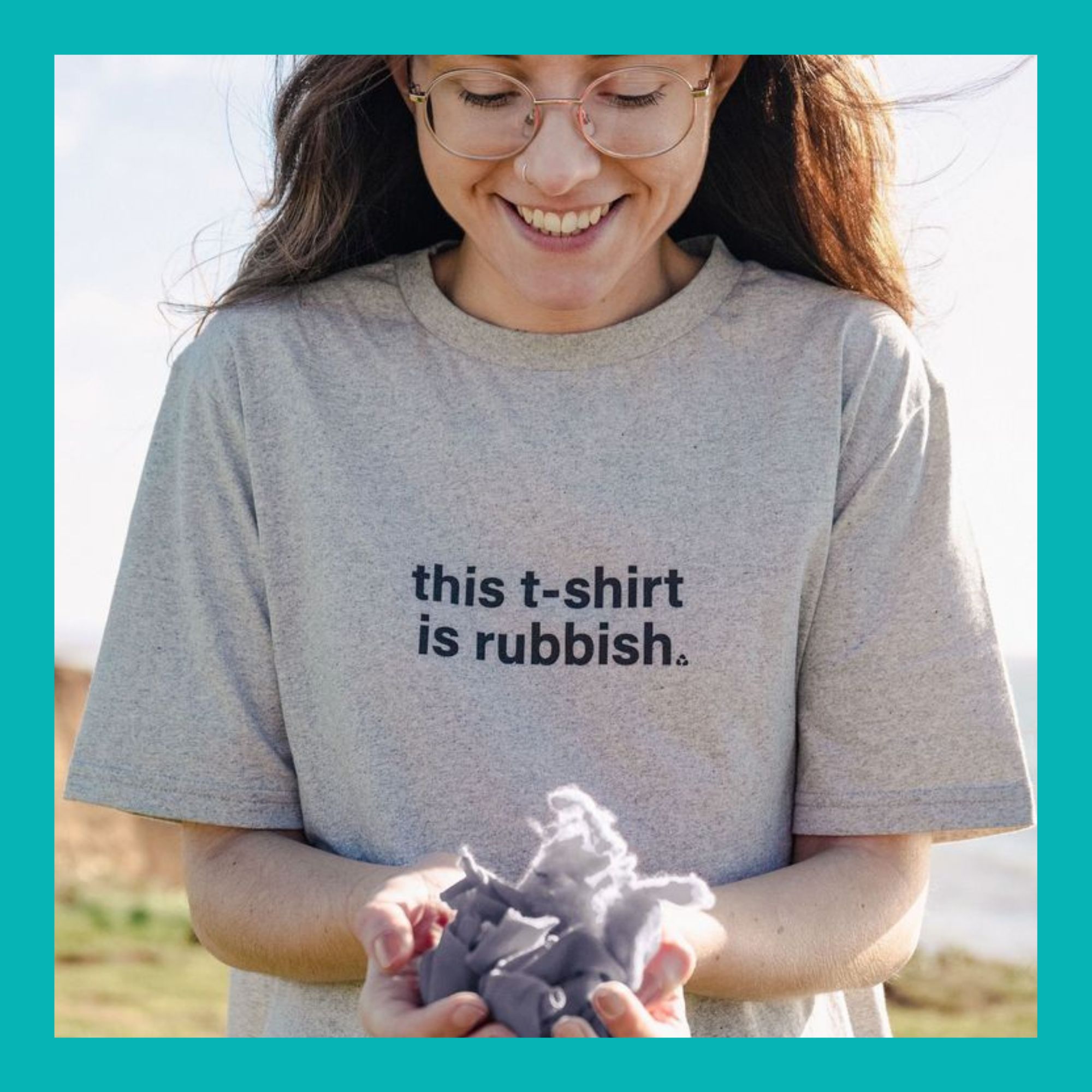As we strive for a more sustainable future, businesses have a crucial role to play. Sustainable marketing is the key to aligning your business goals with environmental responsibility. By using the 7 Ps of sustainable marketing, companies can navigate the path towards sustainability while meeting customer demands.
The traditional marketing mix has been extended to include seven Ps. This framework helps businesses achieve long-term success, while also having a positive effect on the planet and society.
Product
Product focuses on developing offerings that are environmentally friendly, ethically sourced, and designed for longevity. Companies can explore innovative materials, reduce waste, and embrace circular economy principles. Businesses can reduce their carbon emissions and appeal to eco-friendly customers by prioritising sustainability in product design and manufacturing.
By offering sustainable and eco-friendly products or services, businesses can meet the growing consumer demand for environmentally conscious alternatives. This entails using ethically sourced materials, reducing waste throughout the production process, and designing products with longevity in mind.
Adopting sustainable manufacturing practices reduces the company’s carbon emissions. It also shows a commitment to corporate social responsibility. This positions the brand as a leader in the green market.
Price
The price of a product reflects its perceived value. Sustainable marketing takes into account the true cost of production, including social and environmental impacts. Embracing fair trade practices, transparent pricing, and eco-labelling can build trust and enhance the benefits for customers seeking sustainable options.
Businesses can help consumers make more conscious choices by communicating the long-term benefits and savings of eco-friendly products. This can help to encourage people to invest in sustainable products. Thereby supporting the growth of sustainable markets and driving positive change across industries.
The higher cost of some more sustainable products or services doesn’t put consumers off. In fact, 18% of consumers think ‘planet first’ when it comes to purchasing decisions (Rogers, 2021).
This customer segment is aware of the consumption impact, and yet they are positive about the future. They prefer to shop locally and buy local products. Most importantly they expect transparency from businesses.
Place
Place refers to the distribution channels and strategies used to reach customers. Sustainable marketing emphasises minimising transportation emissions, exploring local sourcing options, and optimising supply chain efficiencies. By reducing the distance between production and consumption, businesses can lower their carbon footprint and support local economies.
Additionally, leveraging digital platforms and e-commerce can provide convenient access to sustainable products while reducing the need for physical stores.
Businesses can reduce their ecological footprint by practicing sustainable distribution. This also enhances their brand image, showing that they are socially responsible and environmentally conscious.

© Can Marketing Save the Planet, 2022
Promotion
Promotion involves communicating the value of sustainable products and their positive impacts. In sustainable marketing, businesses must educate consumers about the environmental and social benefits of their offerings.
Utilising digital marketing channels, social media platforms, and content marketing, companies can engage customers and create awareness around sustainability issues. Collaborations with influencers and environmental organisations can further amplify the message and foster a community of like-minded individuals.
Promotion is a critical aspect of sustainable marketing campaigns. Effective communication is key to educating consumers about the environmental and social benefits of sustainable products and services. Leveraging digital marketing channels, social media platforms, and content marketing.
Companies can integrate sustainability into their marketing activities. This will help them be seen as leaders in green marketing. Additionally, it will enable them to create consumer-oriented marketing campaigns that can motivate people to make a difference.
People
The People aspect of sustainable marketing focuses on fostering a culture of sustainability within the organisation and engaging stakeholders. Employees can be empowered through training and labour practices. This allows businesses to match their internal values with external sustainability goals.
Listening to customer feedback, involving communities in decision-making processes, and addressing social concerns can improve brand reputation. This can also help to build strong relationships.
Businesses can practice ethical marketing strategies to align their values with those of their target audience. This will create a more sustainable and inclusive future.
Process
Process refers to the operations and practices that support sustainable manufacturing and distribution. Adopting energy-efficient technologies, reducing waste through recycling and upcycling, and implementing responsible sourcing standards are vital for sustainable marketing.
By regularly assessing and improving these processes, businesses can minimise their environmental impact and efficiently use resources. Transparent reporting on sustainability efforts can also build credibility and trust with stakeholders.
Physical evidence
Physical evidence is a crucial component of the 7Ps of sustainable marketing as it encompasses the tangible elements that customers perceive. It includes factors such as eco-friendly packaging, sustainable materials, and energy-efficient store designs. Plus the company website, case studies and testimonials, sustainability credentials and office space/buildings.
By prioritising physical evidence, businesses can showcase their commitment to sustainability and create a positive brand image while meeting the growing demand for environmentally conscious products.
The Green 7 Ps in practice

© Rapanui
Rapanui Clothing is a clothing company which embodies 7 Ps of sustainable marketing. Based on the Isle of Wight, it’s passionate about fashion, plastic-free packaging, the sea, and the circular economy. Every aspect of their marketing has been carefully considered which lets their authentic values shine through.
This leading sustainable clothing brand has emerged as a frontrunner in the fashion industry’s sustainability movement. Rapanui has strongly committed to environmental conservation and ethical practices. This has established them as a symbol of responsible and conscious fashion.
One of the key pillars of Rapanui’s sustainability ethos is the use of ethical materials. They use organic and recycled fabrics, such as organic cotton and recycled polyester, and renewable energy in their manufacturing process.
Rapanui uses materials that are renewable and sustainable, reducing the need for non-renewable resources. This decreases the environmental impact of traditional textile production.
In addition to material choices, Rapanui places a high emphasis on transparency and traceability. They offer a unique and innovative traceability system called Teemill which allows customers to trace the origins of their garments. From the sourcing of raw materials to the manufacturing process, customers can gain insights into the brand’s ethical and sustainable practices. This level of transparency empowers consumers to make informed choices and supports the movement towards a more sustainable fashion industry.
Rapanui’s commitment to ethical manufacturing is evident in their supply chain. They ensure fair wages, safe working conditions, and strong worker rights throughout their production process. The brand promotes ethical standards. This fosters a culture of respect and dignity for garment workers. It also encourages social responsibility within the industry.
Furthermore, Rapanui goes beyond creating sustainable products by actively encouraging a circular economy. They offer a take-back scheme where customers can return their old Rapanui products to be recycled into new garments. This system reduces waste and extends the lifespan of clothing. It demonstrates their commitment to sustainability throughout the entire product lifecycle.
Rapanui stands as a beacon of sustainability in the fashion industry. The company is paving the way for a more sustainable and responsible future for fashion.
Ready to grow your business as a force for good? Get in touch with Brevity to learn how The Marketing Mandala will empower your sustainable marketing journey. Call us on 01256 536 000 or email hello@brevity.marketing
Meet likeminded professionals at People, Planet, Pint – an informal monthly networking event for anyone who wants to have conversations and share insight about sustainability and how to use their business for good. Brevity hosts People, Planet, Pint in Basingstoke, Hampshire and Worthing, West Sussex.

 Written by Laura Brown
Written by Laura Brown